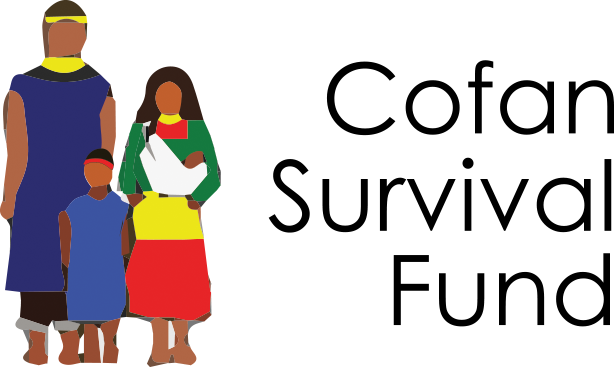Greetings Cofan Survival Fund Supporters!
As President of the Board of the Cofan Survival Fund (CSF), I’m writing with two updates on the work we’re doing to help the Cofan protect their homeland, maintain their way of life, and ensure their survival into the future. One is “good,” and the other is “bad,” but both illustrate the tremendous challenges facing the Cofan Nation and what we can do to help the Cofan overcome them.
First, the good. We’re proud to announce that Gissela Yumbo, a resident of the Cofan community of Zábalo, has successfully defended her thesis in engineering at SEK University in Quito! Gissela is a beneficiary of our Cofan Higher Education Project, and she’s also the first Cofan woman to finish college. The fact that she chose such a difficult subject is a testament to how driven and capable she is. We’re confident Gissela’s engineering skills will be of immense use in the Cofan Nation’s struggles to find sustainable income sources for its members.
And now, the bad. I recently received a report from Carlos Descanse, another participant in our Cofan Higher Education Project. Carlos’s studies in Quito are going well, but his home community of Chandia Na’e is facing a tremendous threat. Recently, illegal gold miners have invaded the land bordering Carlos’s community. You can see one of the pits they excavated in the above photo, which Carlos took. His village is one of four Cofan settlements inside the Cofan-Bermejo Ecological Reserve (RECB), a 140,000-acre protected area the CSF helped to establish in 2002. The reserve is unique in that Cofan people have the legal right to co-manage and co-administer it alongside Ecuador’s Ministry of Environment and Water. Unfortunately, the integrity of the RECB is now in danger because of the Ecuadorian government’s inability—or unwillingness—to protect it and its Cofan inhabitants.
The RECB was created with the expectation that Cofan people would be the ones to care for it. While our Cofan Park Guard Program was in full force, Cofan rangers regularly patrolled the reserve and kept miners, loggers, commercial hunters, and settlers out. After the gradual loss of funding for the program, however, the only people left to protect the RECB are a government-appointed manager and his small team of rangers. Rather than put Cofan people into these positions, the government has given them to non-Indigenous city dwellers, who have neither the capacity nor the motivation to confront the miners, destroy their camps, and confiscate their equipment, all of which the Cofan Park Guards once did on a regular basis. Instead, the government employees spend nearly all their time at the RECB “headquarters,” a small office many miles away in a non-Indigenous town.
With your increased support, we can work with our Cofan partners in Ecuador to pressure the government to return control of the RECB to the Cofan themselves and give them the positions and resources to protect their land. Now that more and more Cofan individuals like Gissela and Carlos are receiving college degrees through our Cofan Higher Education Project, more Cofan people will have the formal credentials necessary to assume government posts, including at the RECB. Even with a group of willing and capable Cofan candidates, however, convincing Ecuador’s Ministry of Environment and Water to give them the jobs will take tremendous political lobbying. And even if we do secure these positions for Cofan people, our real goal is to reestablish the Cofan Park Guard Program, which could protect not only the RECB but the Cofan’s entire legalized territory, which amounts to more than one million acres.
In my last newsletter, I announced our new funding campaign, which intends to supplement our strong and diverse group of small donors with a core of 20 to 25 “Cofan Partners” who can give at least $10,000 a year. I’m happy to report that a few gracious individuals have stepped up to the challenge, and Chicago’s Betty Lou Smith Fund has almost single-handedly funded the Cofan Higher Education Project. However, we need more donations of all amounts to secure the $250,000 annual sum that will enable us to fund Cofan conservation, land-rights, and education campaigns at the levels they require. By now, you’re probably expecting my familiar plea: $250,000 sounds like a lot—and it is—but it amounts to $.25 an acre to protect some of the most beautiful, biodiverse, and carbon-rich forests in the world as well as the livelihoods of the Cofan people who call them home.
If you’re interested in giving for the first time, increasing your donation, becoming a recurring donor, or giving at the level of a Cofan Partner, feel free to reach out to me personally at michael.cepek@utsa.edu. As an anthropologist who’s been studying, supporting, and donating to the CSF for more than two decades—and who receives no compensation for my CSF-related work—I’d be happy to let you know why I believe this effort is so important. I’d also love to arrange an online meeting between you and our Cofan partners in Ecuador at the Fundación Sobrevivencia Cofan. As a U.S.-based nonprofit, the CSF has virtually no financial overhead, which means that all your contributions go directly to the Cofan activists who know exactly what to do with them.
You can contribute online by credit card by clicking on our website: www.cofan.org. Or you can mail a check to: Cofan Survival Fund, 53 Washington Boulevard, Oak Park, IL 60302. Another way to give, if you shop at amazon.com, is to go to smile.amazon.com and select the Cofan Survival Fund as your designated charity. Then, Amazon will donate 0.5% of the price of every one of your purchases to the CSF.
Sincerely,
Michael L. Cepek, CSF President
CSF is a 501(c)(3) non-profit organization, and donations are tax deductible to the fullest extent allowed by law. For gifts of $250 and larger, you will receive a receipt for tax purposes.
